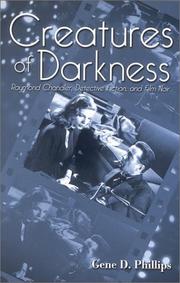| Listing 1 - 3 of 3 |
Sort by
|
Book

ISBN: 2869065132 2869062141 Year: 2017 Publisher: Tours : Presses universitaires François-Rabelais,
Abstract | Keywords | Export | Availability | Bookmark
 Loading...
Loading...Choose an application
- Reference Manager
- EndNote
- RefWorks (Direct export to RefWorks)
La curiosité et le désir de cerner les spécificités d'un genre que les Afro-Américains se sont approprié à l'aube du 20e siècle, telles sont les intentions de recherche animant le présent volume. Beaucoup lu par tous les publics (Chester Himes connut d'abord le succès en France), le polar afro-américain reste relativement peu étudié en dépit d'une production très abondante et diverse depuis les années soixante. Diverse parce qu'elle a essaimé hors de la côte Est, et parce que les romancières sont venues l'enrichir. Le vécu racial, comme nous le disent BarbaraNeely, Paula Woods et Gar Haywood est au cœur de ce genre populaire : la mémoire noire, les lieux noirs et les environnements humains qui construisent l'être - d'où une incursion en Caraïbe francophone. Curiosity and the desire to grasp the specificity of an abundantly read African American genre born as the 20th century was beginning are the research intentions that inspire this volume. Indeed, only recently has African-American detective fiction drawn the attention of scholars in spite of its very diverse blossoming since the 1960s. Diverse, because it has moved out of its birth place, East coast cities, and because female novelists have contributed their own production. At the heart of this popular genre, as novelists BarbaraNeely, Paula Woods and Gar Haywood tell us, is black existence: black memory, black living places and the human environments that build the individual - hence a détour to the French Caribbean.
Literature (General) --- roman --- roman américain --- roman policier américain --- auteur --- auteur noir américain --- author --- African American author --- novel --- American author --- American thriller

ISBN: 0813190428 0813147905 0813160014 9780813147901 0813121744 9780813121741 9780813190426 9780813127002 0813127009 9780813160016 Year: 2000 Publisher: Lexington, KY : University Press of Kentucky,
Abstract | Keywords | Export | Availability | Bookmark
 Loading...
Loading...Choose an application
- Reference Manager
- EndNote
- RefWorks (Direct export to RefWorks)
More than any other writer, Raymond Chandler (1888-1959) is responsible for raising detective stories from the level of pulp fiction to literature. Chandler's hard-boiled private eye Philip Marlowe set the standard for rough, brooding heroes who managed to maintain a strong sense of moral conviction despite a cruel and indifferent world. Chandler's seven novels, including The Big Sleep (1939) and The Long Goodbye (1953), with their pessimism and grim realism, had a direct influence on the emergence of film noir. Chandler worked to give his crime novels the flavor of his adopted city, Los Angel
Detective and mystery stories, American --- Detective and mystery films --- Noir fiction, American --- Motion picture plays --- Marlowe, Philip (Fictitious character) --- Film noir --- Roman policier américain --- Films policiers --- Roman policier noir américain (Genre littéraire) --- Scénarios de cinéma --- Marlowe, Philip (Personnage fictif) --- Films noirs --- History and criticism. --- Histoire et critique --- Chandler, Raymond, --- Criticism and interpretation. --- Film and video adaptations. --- Motion picture plays. --- Influence. --- Roman policier américain --- Roman policier noir américain (Genre littéraire) --- Scénarios de cinéma --- צ׳אנדלר, ריימונד, --- צ׳נדלר, ריימונד, --- レイモンドチャンドラー, --- Detective and mystery films. --- Detective and mystery stories, American. --- CHANDLER (RAYMOND), 1888-1959 --- ROMAN POLICIER AMERICAIN --- ADAPTATIONS CINEMATOGRAPHIQUES ET TELEVISEES --- ADAPTATIONS CINEMATOGRAPHIQUES --- HISTOIRE ET CRITIQUE
Book
ISBN: 0802069541 0802005195 144262308X 9781442623088 9780802005199 9780802069542 1442655631 Year: 1995 Publisher: Toronto, [Ontario] ; Buffalo, [New York] ; London, [England] : University of Toronto Press,
Abstract | Keywords | Export | Availability | Bookmark
 Loading...
Loading...Choose an application
- Reference Manager
- EndNote
- RefWorks (Direct export to RefWorks)
Names such as Sherlock Holmes, Hercule Poirot, and Sam Spade are perhaps better known than the names of the authors who created them. The woman detective has also had worldwide appeal; yet, with the exception of Christie's Miss Marple, the names of female detectives and their authors have only recently gained wide attention through the popularity of Marcia Muller, Sue Grafton, and Sara Paretsky.The essays in this collection grapple with a wide range of issues important to the female sleuth - the most important, perhaps, being the oft-heard challenge to her suitability for the job. Not surprisingly, gender issues are the main focus of all the essays; indeed, in detective novels with a woman protagonist, these issues are often right at the surface.Some of the papers see the female sleuth as an important force in popular fiction, but many also challenge the notion that the woman detective is a positive model for feminists. They argue that fictional female sleuths have lost the `otherness' that a feminine approach to the genre should encourage. Collectively, the essays also reveal the differences between British and American perspectives on the woman detective.
American fiction --- Detective and mystery stories, American --- Detective and mystery stories, English --- English fiction --- Feminism and literature --- Feminist fiction, American --- Feminist fiction, English --- Women and literature --- Women authors --- History and criticism. --- History --- Women and literature |zEnglish-speaking countries |xHistory|y20th century --- English-speaking countries --- Thematology --- Sociology of the family. Sociology of sexuality --- Literature --- Paretsky, Sara --- Grafton, Sue --- English literature --- American literature --- Women authors&delete& --- History and criticism --- English-speaking countries. --- Anglophone countries --- ROMAN POLICIER AMERICAIN --- ROMAN POLICIER ANGLAIS --- ROMAN POLICIER CANADIEN (ANGLAIS) --- ROMAN ANGLAIS --- ROMAN AMERICAIN --- ROMAN CANADIEN (ANGLAIS) --- FEMMES POLICIERS DANS LA LITTERATURE --- FEMINISME DANS LA LITTERATURE --- HISTOIRE ET CRITIQUE --- FEMMES ECRIVAINS --- Feminism --- Literary genres --- Writers --- Images of women --- Book --- Detective novels
| Listing 1 - 3 of 3 |
Sort by
|

 Search
Search Feedback
Feedback About
About Help
Help News
News